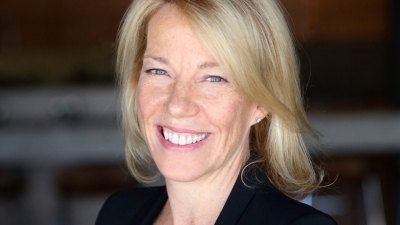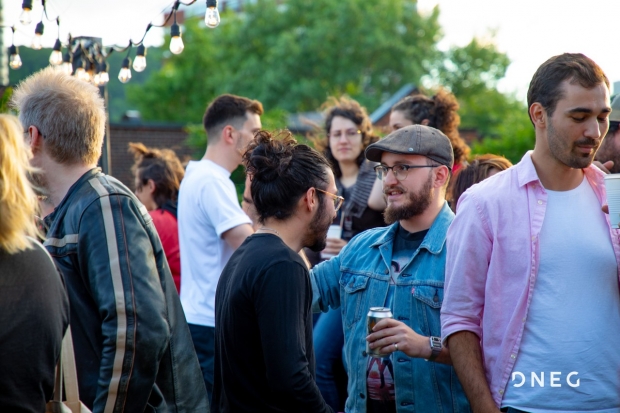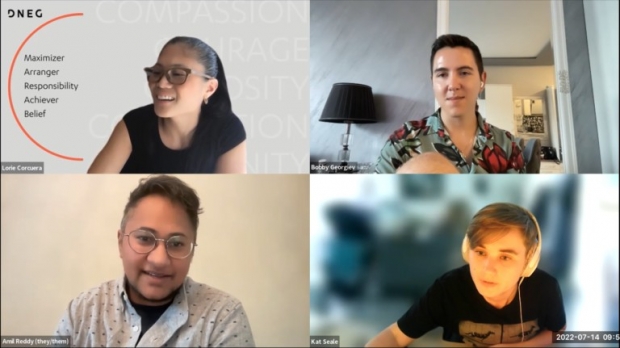For the leading VFX and animation company, senior management is all in with a new set of EDI initiatives and resources to support their talented, diverse, and expanding staff across 9 international studios.
The complex, ever-evolving engines behind animation and VFX production always run at full-speed. From storyboarding and visual development to lighting, compositing, and rendering, it’s easy to get caught up in the rush of the job – projects often involve hundreds of highly skilled artists – and the momentum of pushing out the latest, greatest, most innovative animation.
But, as with any machine, if the individual parts are not taken care of, it doesn’t matter how revolutionary the technology or story might be. If gears are damaged, worn down, or rusted, the machine simply won’t work properly.
“At DNEG, we have an incredibly compassionate, empathetic, and engaged management team and recognize that the fundamental foundation of our business is the people, and if we do not take care of our people, we can't do anything,” says President of DNEG Animation, Erika Burton. “The employees are not just a number inside of a company. We care about every individual, and we care about their mental wellbeing. That is always our primary goal. This is a business but, at the end of the day, it's a creative business, and we have to keep people engaged.”
DNEG, one of the world's leading visual effects and animation studios, is known for its work on productions like Stranger Things Season 4, Uncharted, Death on the Nile, The Matrix Resurrections, Dune, and Ron’s Gone Wrong. The studio has nine facilities located across the world – London, Vancouver, Mumbai, Los Angeles, Chennai, Montréal, Chandigarh, Bangalore, and Toronto – and, in the last few years, their talented artists have received seven Academy Awards, seven BAFTA Awards, and 18 VES Awards.
 But, as successful as DNEG has been working under the entertainment spotlight, the studio also continues to lead the charge in tending to the mental health and inclusion of the employees behind its success.
But, as successful as DNEG has been working under the entertainment spotlight, the studio also continues to lead the charge in tending to the mental health and inclusion of the employees behind its success.
Before Summer 2021, EDI (Equity, Diversity, and Inclusion) at DNEG was driven for the most part by a number of local Employee Resource Groups (ERGs). Each ERG was provided the necessary support to organize internal activities and events to educate employees around the causes it supported, on a voluntary basis. But, in June of 2021, an internal EDI Task Group was formed, including representatives from all DNEG’s global sites, to shape DNEG’s EDI vision, working with senior leadership and the ERGs across the organization.
“For the longest time, our ERGs were just localized small groups of individuals who were very passionate about EDI, and about inclusivity and diversity, and would come together and have periodic meetings, maybe once a month or once a quarter,” explains Delna Dhamodiwala, Global Head of HR at DNEG, responsible for supporting the needs of DNEG’s crews across multiple divisions and locations and leading an integrated team of over 150 people managers across the globe.
She continues, “When I got into the global head role, we decided we needed to bring all these ERGs together and actually globalize the initiative of EDI. That’s when we started quite a bit of work on building a task force, getting a Diversity Audit done, and setting up our strategy for EDI and goals we wanted to achieve. We were very clear from the very beginning that we didn't want our EDI initiative to just be a tag on the website. We wanted to walk the talk.”
DNEG conducted its first Diversity Audit in July 2021, with the intention of identifying opportunities to bring greater equity, diversity, and inclusion into life at the company, tackling topics such as the lack of female leadership in the VFX business, lack of support for those in the visual effects and animation industries who wished to start a family, and lack of mental health awareness within animation and VFX studios.
Since the first audit, the Task Group has been meeting to review the results and set commitments around safety and inclusivity at work, allyship, and industry best practices. Three main programs have emerged from their efforts.
The first is DNEG’s Mentorship Program, which kicked off in Vancouver last year with a six-month pilot.
“We took blossoming women VFX supervisors who are not supervisors just yet, but aspire to be, and we buddied them up with very successful VFX supervisors within the company to hone their skills, both creatively and technologically, boost their confidence in their leadership ability, and their ability to have a seat at the table and feel confident to speak up,” explains Dhamodiwala. “The mentorship program has been received extremely well in the Vancouver location, and we hope to pass it on to our other global locations.”
Burton adds, “We have to start creating the space and utilize the partnerships between the major studios and the visual effects companies and the animation companies in terms of giving people a chance. If they don't have the experience, okay, then let's pair them up with someone who does have more experience. Let's get them on a film set. Let's get them into the room with directors so that they can learn, because the door has not always been open to them. I've been engaged with the Academy on that as well as Women in Animation. It's something that I think starts with awareness, because if we just talk about it and don't do anything, we're never going to create that change.”
Four months after DNEG conducted their Diversity Audit, Women in Animation (WIA) pulled together some statistics of their own. They titled the report “Invisible in Visual Effects,” which explores women’s participation across entertainment industries. On the 400 top-grossing films from 2016 to 2019, women received 21.6% of all VFX credits, yet just 3.5% of CG Supervisors and 2.9% of VFX Supervisors were female. This is a topic particularly close to Burton’s heart.
“I have been involved in panels and conversations about gender diversity, specifically in and around women and the opportunities they’re provided at a higher level in the business and, whether it’s by choice or by force, why there is such a discrepancy between how many male visual effects supervisors there are in the business versus female visual effects supervisors,” says Burton. “The numbers are horrible. They are incrementally getting better, but they're still terrible. We need to make changes.”
Burton herself is no stranger to gender disparity experienced within the Academy.
“I am in the Academy as a member at large, but I was not admitted to the visual effects branch, and I have been in the business for over 30 years,” says Burton. “While I am cognizant that it may not be representative of the opinion of the Academy board, I was anecdotally told that I would not be admitted to the visual effects branch because I am not a man. If this was somehow true, it would be pretty shameful, because I've been on equal footing with a lot of those men for many years, and I was their partner on a lot of films. I would like to think that this is not an accurate barometer of the situation, but either way, there's a lot of work that needs to be done there. Not just for me, but for many women and gender-diverse people in this industry. There is still a barrier that needs to be broken.”
And, at DNEG, it is.
“On the animation side, we have recently elevated a remarkably gifted woman to be an effects supervisor and she's incredibly successful,” notes Burton. “She's incredibly talented and knows what she's doing, but we have also made a conscious decision to give her a seat at the table, and we are very mindful of continuing to look out for that type of promotion for everyone in the community.”
 Another barrier DNEG is hoping to break down with their EDI programs is the idea that those in the film and television industry cannot have children as well as a successful career.
Another barrier DNEG is hoping to break down with their EDI programs is the idea that those in the film and television industry cannot have children as well as a successful career.
“And I think that is something not only women deal with now,” says Burton. “Men deal with it as well where, if they leave the workforce to have a child, they feel that they're going to be left behind, and we need to figure out how we can make people feel secure that they can go away and do that and still have a career, still be thought of as someone that can get a promotion, that can be in a higher level position with more responsibility, even if they do have other responsibilities at home.”
DNEG’s Parental Leave Coaching, which launched at the end of 2021, aims to give employees support in the form of a series of coaching sessions as they go through this period of their lives; giving them time and space to take stock, enabling them to return to work with confidence, able to flourish and comfortably sustain the competing priorities of career and family. Over 50 sessions have been delivered in DNEG’s London site, with plans to extend the program to other facilities.
“This is a really demanding industry,” says Burton. “The hours are very long. When you have a family, the complexities are amplified, and so we are trying to create ways where that is not as much of an issue for people. They can have a family life and they can have an incredibly successful career. It’s hard to find that balance, but we, as a company, try to help people find that balance.”
Balance is at the root of DNEG’s third featured EDI program: Thrive – an umbrella name for mental health and wellbeing initiatives at the company.
“When COVID happened, there was a lot of emphasis and need for all our global locations to focus on mental health and well-being,” says Dhamodiwala. “The artists in the visual effects and animation field are usually always gunning for the next show, the next cool story to put on their resume. But then, when COVID happened, the need was great for us to support our employees in everything that was going on with working from home. There was a quiet period of time in 2020 with great uncertainty, which was the trigger for us. So, we focused on a very diverse range of initiatives.”
DNEG has been providing mental health awareness through Q&As with their employees, discussing the importance of kindness; their “Deep Dive” webinar on how to thrive in VFX and animation; and even in everyday email chains.
“We have people on our team whose email signature lines read, ‘I'm happy to talk. I'm a mental health champion,’ or ‘I’m a mental health first aider,’” notes Burton. “It’s very subliminal, but it gets the message across. There are these very fundamental things that we do here that help to create an environment of, ‘We’re an open company and we recognize that these people need this kind of support in their daily lives.’”
Dhamodiwala actually began her career as a medical doctor before making a pivotal early career transition to HR and says she was rather close to the mental health issue DNEG hoped to remedy.
“When that whole difficult period of 2020 happened, there was no better time to push that initiative further because, globally, the world was in distress and we needed to step up and do something for our people,” she says. “We feel we've done a lot, but we're just one year into giving it very strong sponsorship and support from the senior management side.”
DNEG’s other initiatives include respect in the workplace training, career coaching, women leadership training, awareness events around Pride, Black History Month, and more. They may only be a year into these programs, but the impact they’ve had on those in the company, Burton says, is noticeable.
“It obviously comes through in the work that is on the screen and though that sounds, quite possibly, cliche, if our workforce isn't happy and engaged, we could never deliver the quality and the volume of work that we are delivering,” she shares.
Burton continues, “We are a business that thrives in a community, and we have many, many channels for our employees to find a space where they feel that they are safe to talk about issues that they're having, be it work issues, personal issues, whatever it may be in the grand scheme of their life and/or their projects’ life. We have an incredibly diverse employee population, and they are extremely passionate, and I think that helps to drive all of this. It's not just coming from the top down. It’s also coming from the bottom up. That level of engagement throughout the company is incredibly strong and what makes all this thrive.”










